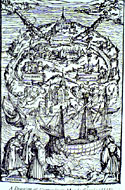|
Spalatinus insisted on being called George, "The patron saint of your
country," he told Sir Thomas More.
"All we wanted was the spread of humanistic values," wailed George in
his modestly furnished apartment on the Fabbrica, "of equality and
tolerance, of salvation through reason and brotherly love."
"You are a humanist?" enquired More.
"I enjoyed a correspondence with Erasmus," said George proudly, "Did he
mention me?" More shook his head. George looked hurt.
"Martin was moody," George continued, "He wanted reforms but often he
would just read the Bible, to the exclusion of other literature. And he
could be so headstrong! I was there when they burnt him, you know.
Even then, his last words were not abjuration, or even for mercy. He
said, 'Here I stand. I can do no other. God help me. Amen.'" This
time it was George who shook his head, "At least, I think his final
shriek was 'Amen'."
Jimmy placed a consoling hand on George, "What Luther did was folly, but
as Erasmus reminds us, we can still praise folly."
More was shocked. Praise the actions of Luther? Was that what Jimmy
meant?
But before he could give voice to his questions, George said something
even more shocking. "There are humanists in the most surprising of
places. Take Loyola and Calvin."
More spluttered, "Both Loyola and Calvin believe in salvation through
reason and brotherly love?"
George nodded.
More was shocked. To believe that Man could be saved this way was a
heresy, one of the worse ones if he recalled correctly. What was it
called? Perfectibilism? Jimmy would know. But before he could ask the
bishop, George said something more shocking still.
"And there are Jewish and Muslim humanists too, that are also on the
path to salvation."
This was piling heresy upon heresy. "How could infidels be saved?"
demanded More.
"If they treat one another with tolerance, as equals," said George,
"With faith in the Great Architect of the universe and living lives of
reason and brotherly love, then why might they not be saved?"
"For the simple reason," insisted More, "That the God of the infidels is
not the same as the God of the Christians."
"Oh, Tommy!" chided Jimmy gently, "You must not anthropomorphise God.
You can't force Him into a form pleasing to you."
"But what of Christ?" More wanted to know.
"You can't anthropomorphise Him either," declared Jimmy. Seeing the
thunderstruck look on More's face and realising what he had just said
might seem a tad Monophysite to the unsophisticated Sir Thomas, Jimmy
changed the subject, "Let us not overlook the vital tidings George has
given us in re Calvin."
More thought back. "What, that he's a humanist?" he hazarded.
"Precisely," said Jimmy, "And if you, a humanist, react in such a way to
the inner teachings of humanism, heretofore kept from you, how might
Calvin's simple peasant followers react?"
"They'd tear him limb from limb!" More paused then turned to George,
"Have you any proof of Calvin's true beliefs?"
"Not I. But my old teacher, Christian, one of the wisest of us, he
studied with Calvin at university. It is he who told me this and he
would have proof."
"Then let us go to this Christian at once!"
George held up a hand. "Not so fast, my friend! Christian resides now
in Constantinople, living under the guise of a Greek merchant. This
allows him to travel freely through the Kingdom of the Turks during the
winter months to seek the ancient wisdom of the East. But this season
you would find him at his home near the Church of St Mary Pammakaristos
in Constantine's City. You cannot miss his shop, it is under the sign
of the cross and rose."
More turned to Jimmy, "Let's go!"
This time both Jimmy and George sought to restrain the Englishman.
Jimmy spoke first.
"Not I, Thomas. I must return to my see. Not to Geneva but the
Catholic countryside. I must plough the fields in preparation for the
seed you will bring back, that the harvest might be fruitful."
More could see it now. Outraged followers killing their leader and then
infighting between the Calvinists - pontifexcides against loyalists.
Then the shocked remnant turning to a merciful Mother Church. That
would be a bountiful harvest indeed!
Then George spoke his piece, "I have an adult daughter, Tamina,
who is studying under Christian.. It is several years since we have
seen each other." He pointed to a portrait on the wall. "She is
homesick but I have forbidden her to return as yet, for it is
dangerous for a girl to travel unaccompanied. But if you would escort
her Thomas, for I am sure she would be safe with you."
Thomas nodded. If Tamina looked like her picture than George could rest
assured he would not allow any other man to lay a hand upon her.
George reached up a wall and unhooked some panpipes. "This flute," he
said, "I used to play her lullabies as a small child. When she sees
this instrument she will truly know you come from me."
| 
